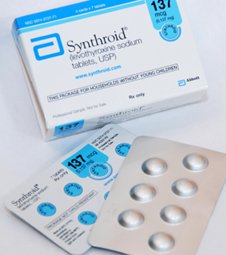Synthroid (levothyroxine sodium) Coupons, Discounts & Cost
Synthroid (levothyroxine sodium) is one of the most used drugs for the treatment of underactive thyroid gland. One way to save money on the Synthroid (levothyroxine sodium) retail cost regardless of income and insurance status is to use Synthroid (levothyroxine sodium) coupons or discount cards from RXCoupons. Use our Synthroid (levothyroxine sodium) coupons at your online pharmacy and receive up to 75% off the sale price each time you refill your prescription.
What is Synthroid (levothyroxine sodium)?
Synthroid (levothyroxine sodium) is one of the most used drugs for the treatment of underactive thyroid gland. Along with other drugs, Synthroid is prescribed against certain types of thyroid cancer.
The average dose of levothyroxine sodium stimulates the metabolism of carbohydrates, fats, proteins and increases the activity of the central nervous system and the cardiovascular system. The drug can help to replenish the body's deficiency of thyroid hormones.
Thyroid hormones increase the body's metabolism, oxygen consumption, respiratory rate, body temperature, heart rate, blood volume, etc. Thyroid hormones play an important role in the development and function of CNS. Hormone deficiency in children leads to abnormally slow growth and other problems.
Synthroid (levothyroxine sodium) indications for use
Synthroid (levothyroxine sodium) is prescribed to treat hypothyroid conditions of various etiologies, including those related to medical and surgical exposure. The drug is indicated for the prevention and treatment of euthyroid diffuse goiter, toxic diffuse goiter, congenital hypothyroidism, which is accompanied by a decrease in mental and physical activity. Levothyroxine is used in combination therapy for the prevention of recurrent thyroid cancer after surgery.
The drug is also used for the differential diagnostic tests that require inhibition of thyroid hormone secretion.
How to take Synthroid (levothyroxine sodium)?
Synthroid (levothyroxine) may be taken after meals or without food, on an empty stomach (preferably in the morning). It is advised to take the medicine at the same time each day for best results. The tablets should be swallowed, but you can also crush the tablet and mix with one or two spoons of water (if you have swallowing difficulty or pain).
The daily dose is appointed strictly individually, depending on the form of the disease and indications. The initial adult dosage for hypothyroidism is 25-100 mcg a day (the dose may be gradually increased by 25-50 mcg every two to three weeks).
Newborns, infants and children older than one year:
Less than 3 months: 10-15 mcg/kg (if a child has a risk of developing heart failure).
Age>3-6 months: 8-10 mcg/kg or 25-50 mcg.
Age>6-12 months: 6-8 mcg/kg, or 50-75 mcg.
Levothyroxine therapy for hypothyroidism may be continued during pregnancy and breastfeeding (dose adjustment required).
Synthroid (levothyroxine sodium) contraindications
Do not use this drug in patients with hyperthyroidism of any etiology, hypersensitivity to levothyroxine. Synthroid should be avoided in patients with adrenal insufficiency and acute myocardial infarction. The drug is contraindicated in high doses during pregnancy (high-dose thyreostatics can cause congenital hypothyroidism in the newborn. You also need to know that Synthroid significantly increases the effects of antidepressants and anticoagulants.
Synthroid (levothyroxine sodium) side effects
Synthroid (levothyroxine) can cause the following side effects: anxiety, irregular heartbeat, chest pain, diarrhea, weight loss, alopecia, tremors, allergic reactions (itching, skin rash).
Unwanted side effects usually develop if you take high doses of the drug. In this case, you should stop treatment or reduce the dose.
Synthroid overdose may lead to thyrotoxic crisis.
Synthroid (levothyroxine sodium) special instructions
Before taking Synthroid (levothyroxine), you should inform your doctor if you have coronary artery disease, heart disease, anemia, diabetes, clotting disorders or pituitary problems. If you use insulin or any other medicine for diabetes, consult with your doctor before you start taking Synthroid.

